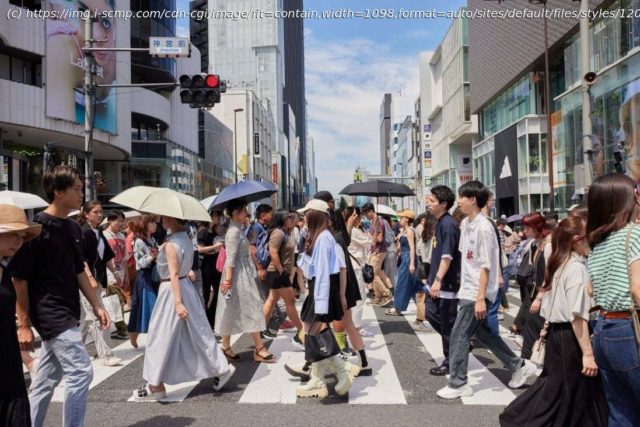About one-fifth of Japan’s population are millennials. They’ve spent their entire lives in an economic slump and are mostly just happy to stay afloat – with no plans to have children, own a home, or get rich.
At 36, Makoto Isechi finally feels like he can start living life. The freelance software engineer and his wife, an aspiring chef, are several months away from being debt-free. A high-school graduate who grew up in Kagoshima, on Japan ’s southern coast, Isechi started his career selling musical instruments at a retail store, then played guitar in a small band before founding an IT company with a fellow musician. When the firm went bankrupt in 2019, he found himself saddled with US$35,000 in debt, while his wife took out loans to pay for culinary school. Isechi closed his company and decided to be a freelance website designer, teaching himself how to code and use Photoshop by watching YouTube videos and taking online courses. Over the past three years, he’s slowly built a client base and now earns US$7,500 a month. “Now we can start our future,” Isechi said. That future doesn’t entail much change for the couple. His wife is thinking of moving from their three-room flat in Osaka to open an Italian restaurant in the countryside, but they have no plans to have children, own a home, or get rich. Like many Japanese millennials, Isechi is content with living life as it is, happy to stay afloat as they watched their nation endure crippling economic crises and natural disasters. Japan is wrong – deflation was not the cause of its economic woes The Pew Research Centre think tank in the US defines millennials as those born between 1981 to 1996, so they are between the ages of 24 to 44 now. This means that while American millennials might have started their careers during the 2008 Great Financial Crisis, their Japanese peers have spent their entire lives in an economic slump. Roughly 27 million people – or about one-fifth of the country’s total population – in Japan are millennials. In comparison, the United States is home to 72 million millennials, while China has around 400 million millennials. Three millennials in Japan, as well as two economists, were interviewed for this article. The findings about their career aspirations, their spending habits, and their financial decision-making speak to the typical millennial in Japan, but not every member of that generation. The typical Japanese millennial is financially conservative, having grown up watching their country’s “Lost Decade” suffer from a devastating economic crisis. My mother would often tell us, ‘Never take a loan for anything at all’ Makoto Isechi on growing up during Japan’s ‘Lost Decade’ Growing up in the early 1990s in the southern Japanese city of Kagoshima, Isechi and his younger brother watched their parents struggle with mortgage and car payments amid Japan’s worst economic crisis of modern times. “My mother would often tell us, ‘Never take a loan for anything at all,’” Isechi said. Isechi might not have heeded his mother’s advice, but he said the financial pains of his childhood continue to govern his mindset today. “The millennial generation in Japan started life in a downturn when the bubble popped and many of their parents were impacted. So the millennials were, just as much or if not more, affected, in many ways,” said Seijiro Takeshita, dean at the University of Shizuoka’s graduate school of management, informatics, and innovation. The blessing and curse of Japan’s crazy low mortgage rates From 1986 to 1991, Japan experienced an economic bubble during which assets and property prices were vastly inflated. Then Japan’s asset bubble burst in the early 1990s. The situation was so bad that Japan’s benchmark Nikkei 225 index slumped 40 per cent a year after the index hit a high of nearly 39,000 in December 1989 – and it still hasn’t recovered after 30 years. Japan’s economy grew an average of around 4 per cent in the 1980s – but that dropped to around 1 per cent to 3 per cent for most years since the 1990s. In particular, the 10 years starting with 1991 are known as Japan’s “Lost Decade”, as the country’s unemployment rate more than doubled from 2.1 per cent in 1991 to a historic high of 5.4 per cent in 2002. “Japan’s economy fell into stagnation which has lasted three decades, so the millennial generation has never experienced very good economic situations,” said Takahide Kiuchi, an executive economist at Nomura Research Institute. “These conditions made them more cautious in terms of spending and conservative in terms of working style.” It didn’t stop at the Lost Decade. Japanese millennials spent their entire lifetimes witnessing disaster after disaster – including the Asian financial crisis of 1997 and the earthquake and tsunami of 2011 . The successive disasters and the economic havoc the events wrought shaped Japanese millennials and their world view, making them “more realistic than the generation before them,” which revelled in the excess of the country’s economic boom, Takeshita said. They are not like the generation before who are like, ‘go, go, go, work hard’, work till death – because they’ve seen so much negativity Seijiro Takeshita, University of Shizuoka But there’s an upside, too. “They are not like the generation before who are like, ‘go, go, go, work hard’, work till death – because they’ve seen so much negativity, be it in international affairs or natural disasters,” Takeshita added, referring to the concept of karoshi , or death by overwork.






